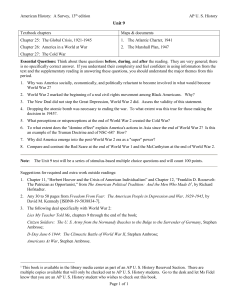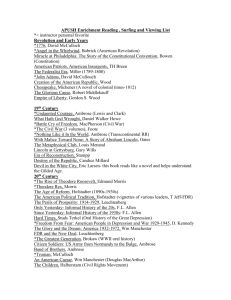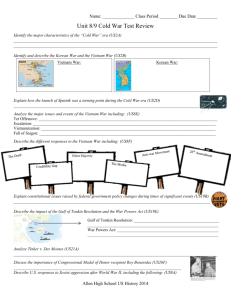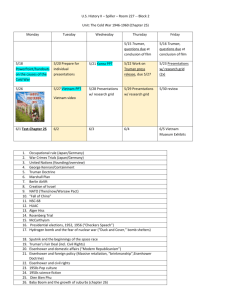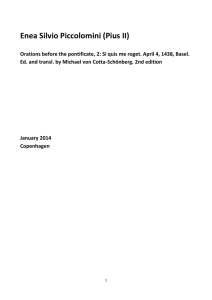Ambrose Introduction Questions 1. Explain the book's title. 2. What
advertisement
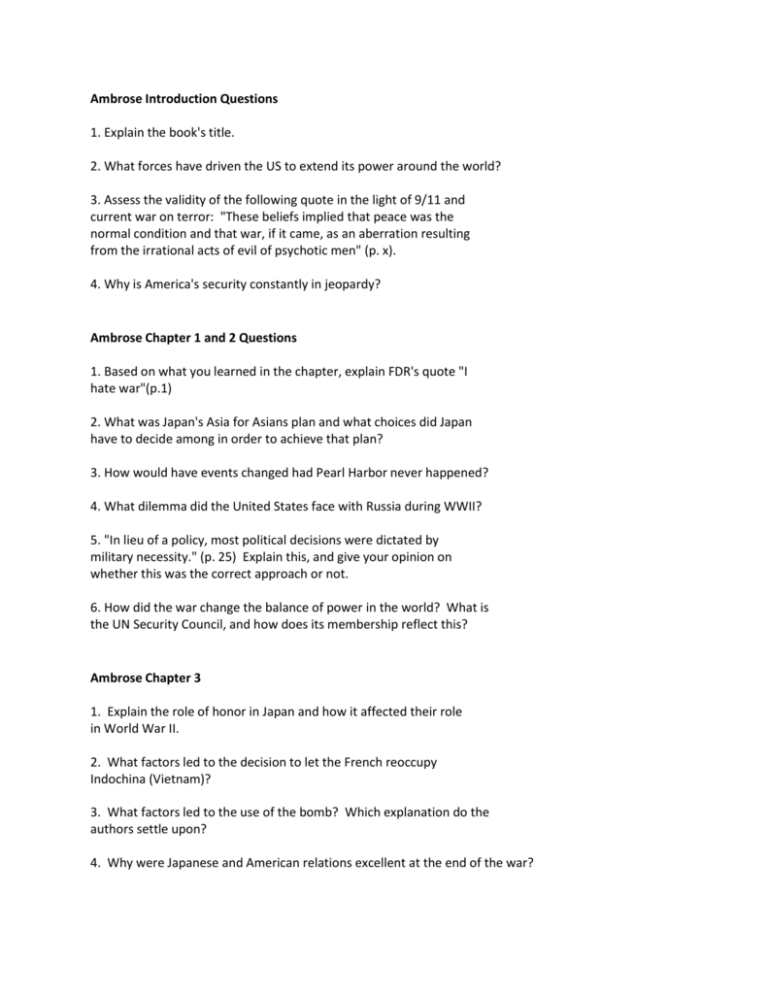
Ambrose Introduction Questions 1. Explain the book's title. 2. What forces have driven the US to extend its power around the world? 3. Assess the validity of the following quote in the light of 9/11 and current war on terror: "These beliefs implied that peace was the normal condition and that war, if it came, as an aberration resulting from the irrational acts of evil of psychotic men" (p. x). 4. Why is America's security constantly in jeopardy? Ambrose Chapter 1 and 2 Questions 1. Based on what you learned in the chapter, explain FDR's quote "I hate war"(p.1) 2. What was Japan's Asia for Asians plan and what choices did Japan have to decide among in order to achieve that plan? 3. How would have events changed had Pearl Harbor never happened? 4. What dilemma did the United States face with Russia during WWII? 5. "In lieu of a policy, most political decisions were dictated by military necessity." (p. 25) Explain this, and give your opinion on whether this was the correct approach or not. 6. How did the war change the balance of power in the world? What is the UN Security Council, and how does its membership reflect this? Ambrose Chapter 3 1. Explain the role of honor in Japan and how it affected their role in World War II. 2. What factors led to the decision to let the French reoccupy Indochina (Vietnam)? 3. What factors led to the use of the bomb? Which explanation do the authors settle upon? 4. Why were Japanese and American relations excellent at the end of the war? 5. What was America's chief asset in 1945? 6. "In September 1945 America's prestige, like its relative power in the world, had never been higher." How did this happen? Ambrose Chapter 4 1. Explain the following quote: "The Soviet Union occupied. This crucial result of World War II destroyed the Grand Alliance and gave birth to the Cold War" (p.53) 2. Why was Poland such a significant issue? 3. What was the main idea behind Churchill's iron curtain speech? How did Stalin react to it? 4. What role did the bomb come to play in America's foreign policy? What dilemma did it create that ultimately limited it's use? 5. Why did the arms race begin? What role did the bomb and the Red Army play? Ambrose Chapter 7 1. Why is the Korea War commonly referred to as "police action" rather than a war? Do you agree with the "police action" classification? Why or why not? 2. What was the "bomb at the Waldorf?" How did Allied nations respond to it and was such a reaction merited? 3. What was British PM Atlee's position on the use of the atomic bomb on China? Why? 4. "If the Korean War came to a sudden end, so would NSC 68 and the entire program that went with it" (p. 125). Briefly explain what NSC 68 is and then assess the truth behind that statement. You may need to refer back to chapter 6 for information about NSC 68. 5. How did Truman's policies and the Korean War make the Cold War more permanent? (Take a look at page 124 to get yourself started)? Ambrose Chapter 8 1. What contradiction exists between Eisenhower’s rhetoric and foreign policy towards communism? How did this play out in Korea? 2. What was the “New Look” and what was the key to it? Would it have worked when Truman was president? Could it work today? 3. Explain massive retaliation and brinksmanship. Do you find Dulles’ policies comforting or frightening? Explain. 4. Why did Eisenhower want allies in Vietnam? What analogy does he use to describe the danger of losing it? 5. What is SEATO and why was it formed? What about it made it “clearly no NATO for Southeast Asia? 6. Why was communist Russia not viewed in the same light as the rest of the Western white world by the third world? Is there any situation similar to that in the world today? Ambrose Chapter 9 1. Eisenhower was recruited by both parties to run for president. What evidence from the chapter can you find that demonstrates his moderate nature that would account for this contradiction? 2. “It had been quite a week for lessons. American politicians learned to stop their irresponsible prattling about liberation. The Russians learned just how strong a force nationalism was in Eastern Europe, while the Israelis saw that they would have to make it on their own in their conflict with the Arabs” (pg 157). Explain how these lessons were learned. 3. What did the Gaither Report reveal? How did Eisenhower respond? 4. How would have the events mentioned in this chapter have been handled by a hardliner? 5. How did the May 5, 1960 U-2 incident prove how entrenched Cold War incidents were? What did it say about the future of the Cold War? 6. As Eisenhower left Washington, how had the administration responded to Cuba and the emergence of Castro? What did they leave behind for Kennedy? 7. Was Ngo Dinh Diem committed to reform in South Vietnam? Explain. 8. How did Quemoy and Matsu both test brinkmanship and shift the balance of power between the branches of government in the US? 9. Why were the 50s considered the “glory days” of the CIA? Explain one success. Ambrose Chapter 11 1. Who are the Green Berets and what is their importance to Vietnam? 2. Why did the United State insist on supporting President Diem, even when it recognized his flaws? 3. What is the “hamlet program” and would you have supported it? What does Ambrose think of it? 4. Compare the quote below (from page 197) to the arguments people use today in support of the war in Iraq. Do you think it is a valid argument? Explain. “ Our goal is a stable government [in Vietnam], carrying on a struggle to maintain its national independence. We believe strongly in that...In my opinion, for us to withdraw from that effort would mean a collapse not only of South Vietnam but of Southeast Asia. SO we are going to stay there.” JFK 5. What difference would it have made had the attack on the Gulf of Tonkin been provoked? 6. How might the Gulf of Tonkin Resolution be seen as unconstitutional? 7. What comparisons can be made between U.S. involvement in the Dominican Republic and U.S. involvement in Vietnam? 8. What is so significant about the Tet Offensive? Ambrose Chapter 12 1. What options did Nixon face with regard to Vietnam, and which one did he ultimately chose? a. Would you have chosen that one? Why or why not? 2. Explain Vietnamization. Do you think it could have worked? Explain. 3. Explain the main idea behind linkage and how it was used during Vietnam. 4. What is mutual about MAD? 5. What possibilities were in the Sino-Soviet split and were they realist? Why or why not? 6. Why was Congress afraid to stop funding the war, and what action was taken as a result? 7. What lesson learned in Vietnam was President Ford referring to (see page 251)?
